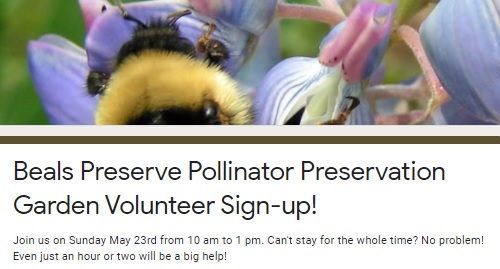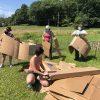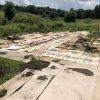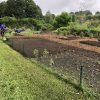Above: OSPC and SOLF are seeking volunteers to help lay the groundwork for a special garden.
As I’ve previously posted, this spring a new “Pollination Preservation Garden” is being created at Beals Preserve. This weekend, organizers will be working on the first steps for building the garden. They are seeking volunteers to sign up to join them on out Sunday morning.
The garden is part of the Open Space Preservation Commission’s initiative to increase native plants to support native pollinators. This project is in partnership with the Southborough Open Land Foundation which owns the preserve.
The volunteer event is on Sunday, May 23 at 10:00 am – 1:00 pm:
Join us on Sunday May 23rd from 10 am to 1 pm. Can’t stay for the whole time? No problem! Even just an hour or two will be a big help!
(For those of you worried about a potential schedule conflict, if there is a second day of Annual Town Meeting, it won’t begin until 1:00 pm.)
You don’t need a green thumb to help this day. Volunteers will be “shingling” the area with cardboard, then covering it up with mulch to “smother existing vegetation”. OSPC’s Freddie Gillespie shared some pictures of similar work done at Breakneck Hill last summer to prep for planting their (much larger) Beecology Garden on the conservation land.
I’m sharing those pics and the announcement below. To signup, click here.
Announcing a New Pollination Preservation Garden at Beals Preserve
The Southborough Open Space Preservation Commission and the Southborough Open Land Foundation announce a Joint Venture Project to increase biodiversity at the Beals Preserve
Volunteers Wanted! Sunday May 23, 10 AM.
You can help with the initial preparation of the Beals Preserve Pollination Preservation Garden. Stop by to help or say hello and see where the new garden will be.
This Pollination Preservation Garden is being created as a joint effort by the Southborough Open Land Foundation (SOLF) & Southborough’s Open Space Preservation Commission (OSPC). This new project is one of many throughout town that the OSPC is engaged in as part of their Native Plant • Native Pollinator Initiative
The Beals Preserve Pollination Preservation Garden will be located in field on the Main Street side of the aqueduct.
Thanks to the efforts of many involved, including SOLF President Whitney Beals and OSPC Chair Freddie Gillespie, work has already started. Katheryn Korostoff is the Volunteer Coordinator. The garden will be filled with the specific native plants that support declining species of native pollinators. The plants will all be from Dr. Robert Gegear’s Plant List for At-Risk Species of Pollinators. Dr. Gegear has been working with the OSPC since 2015 and Breakneck Hill Conservation Land was his first research site in the state.
Our first volunteer work day will be Sunday May 23rd at 10 AM
Sunday’s Volunteer Work Day will provide the first step in preparing the garden. Cardboard will be laid down like wall to wall carpeting and woodchips placed on top. This will smother the existing vegetation to create a planting bed for the late summer or fall.
If you would like to learn more or to volunteer to help with this exciting new project, click here for the sign-up form and more details. http://bit.ly/GardenVol
The signup page includes the following detail (and I inserted a corresponding image from Google maps below):
Work gloves a must. You may wish to wear a hat and use sun screen. Consider using insect repellant. Wear long pants for tick and poison ivy prevention. Wear boots or sneakers, no open toe sandals. Bring water.
We will send out a confirmation email on Friday May 21st. We will reschedule for heavy rain and notify you via email.
Event Address: The location is in the field on the Main Street side of the aqueduct, near the little bridge. Parking is available along Main Street in the breakdown lane adjacent to the field. If that is all taken, you can park in the Triangle at the intersection of Northboro Road and Main Street and walk over.






Thanks for sharing! This will be a great start to an important project.
A thousand thanks to those involved and for increasing public awareness. These efforts are critical to our food production and ecosystems. For those looking to learn more, see:
http://Www.pollinators.org. Thank you for a fine job and all the hard work!